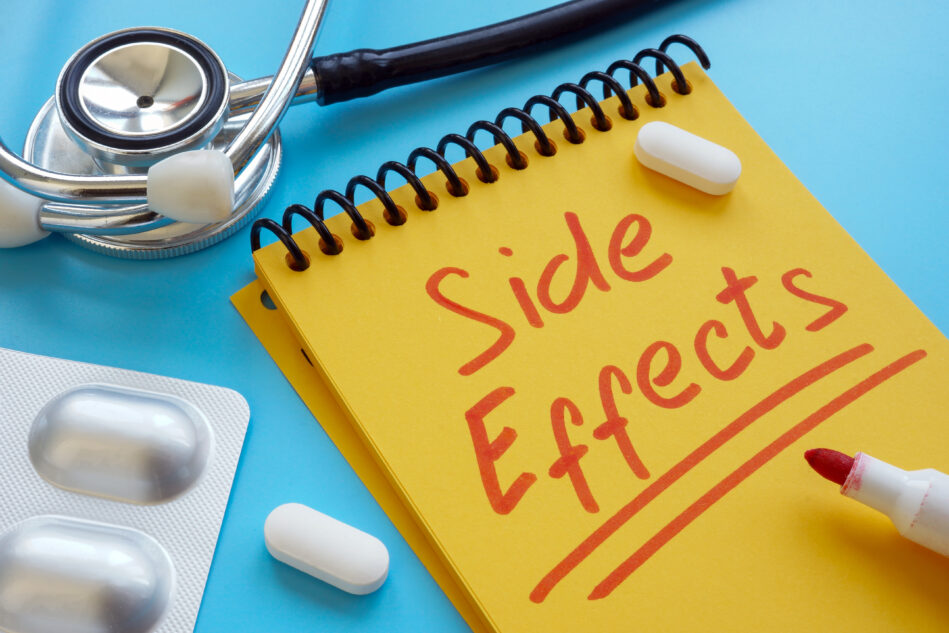Each time you take a pill, slap on a patch, or ingest drops of medicines, you’re exposing yourself to the risk of side effects. Ranging from harmless to harmful, from obvious to eerily undetectable, medicine-induced drug side effects are the fourth leading cause of death in US.
Considering the drug side effects before taking them can save your life.
- Tylenol (acetaminophen) is effective at relieving muscle aches but using the equivalent of just 2 extra-strength pills over the recommended dosage for three days can create serious liver damage.
- Lavender essential oils have properties that relieve anxiety, but can cause estrogen surges in infants (babies with breasts!).
- Statins lower cholesterol, but cause muscle aches and pains, increase your risk of diabetes, and might affect your cognitive reasoning.
We all like to think that’s what happens to other people, most of us don’t worry about side effects until it happens to them. But it happened to me, Suzanne, the founder of MedShadow. I had an adverse effect from a drug that wasn’t discovered for 15 years. Before I was born, my mother was prescribed a drug, DES, that was supposed to help her pregnancy. Instead, it affected the fetus’ fertility organs. I was that fetus and DES affected my fertility organs, leaving me without the ability to bear a child. That drug was given to about five million pregnant women before it was finally banned in pregnancy. For more about my story and why I launched MedShadow, click here. If you would like to know more about DES, go to our sister site: DESAction.
More than 8 million adverse side effects from medications were reported to the FDA from 2012 through 2018. This includes more than 1.7 million deaths from medicines taken as prescribed. Since most adverse effects and side effects aren’t reported, this reflects only a small part of people affected by medicines.
Side effects are personal. They can seriously affect you and your family’s health.
- Read about Kim’s heartbreak when her husband Woody suffered the undisclosed and devastating side effects antidepressants; or
- Rachel’s story about the harms that women aren’t warned about with breast implants; or
- Andrew’s search for help with his military service related injuries when traditional medicines couldn’t help.
There are more than 2 million serious adverse drug reactions in hospitals yearly, leading to more than 100,000 deaths. Side effect awareness, management, and avoidance can change that number.
We learn about new side effects every day
Medicines are almost always tested on very few people, maybe a couple thousand. Therefore, certain side effects that affect only one person in a thousand won’t even show up in the study. The drug is deemed “safe,” and then a million folks are taking it. Now one thousand people are suffering from that seemingly rare side effect—and you could be one of them. This scenario is especially true when it comes to new medicines.
MedShadow —the leading national source for medical information that never accepts pharmaceutical funding—is nonprofit and we are endlessly dedicated to helping you become educated consumers. On this site, you’ll find hundreds of fact-based, easy-to-understand articles with information you deserve about the medicines you use and alternative wellness options so that you can take control of your health care.
Protect yourself and your family from overprescribing
If you are taking even one medicine that you don’t need, you are overprescribed. Seniors are the most likely to be overprescribed — every day 750 of our seniors are hospitalized due to a serious side effect associated with taking multiple medications. More than 40% of seniors take five or more prescriptions a day. Each additional drug used increases by 7 – 10% the likelihood of an adverse drug reaction. Vitamins and supplements can cause interactions and adverse reactions too. What can you do?
- Ask how long you’ll have to take the medicine
- Ask if you will experience withdrawal symptoms when you stop taking the drug.
- Consider your options before agreeing to take a daily medicine. Check out these articles on alternatives to drugs:
The Link Between gut Health, Anxiety and Depression
Lifestyle Changes and Rheumatoid Artrhitis
Can Chinese Herbs Reduce my Need for RX Meds?
6 Tips for Handling Kids’ Migraines
Chest Pain After Eating? Peppermint Oil Can Soothe Non-Cardiac Discomfort
and many more under our Wellness button on the navigation bar (above).
Deprescribing, it’s a thing
Anyone on two or more medicines should ask their doctor to review their medicines annually to see if all the meds are still necessary and to discuss which drugs may not be working for you or might be causing you discomfort from side effects. Seniors should have a drug review twice a year.
Lowering the amount of medicines you are taking can be tricky — some drugs are necessary for your health, some you need to taper off of, some you may no longer need but your doctor still prescribes out of an excess of caution.
You need to work with your doctor, usually your internist. Your doctor should consult with any of your other healthcare professionals who have prescribed a current medicine. Your doctor can then create a chart or matrix of which drugs are essential, which might no longer be needed, which are most likely to be causing side effects and which are drugs prescribed only to manage the side effects of other drugs.
If you are hesitant to approach your doctor go to your local pharmacist who will start the process. Your pharmacist should be able to identify which prescriptions would be the first to ask you doctor about – you might find it more comfortable to ask specifically about warfarin, for example, then about the entire list of prescriptions.
Drug Side Effects That Could Put You in the Hospital
Four types of medicines are most likely to put you in the hospital due to drug side effects/adverse reactions:
- warfarin (Coumadin)
- insulin
- oral antiplatelet agents (aspirin for example)
- oral hypoglycemic agents (Metformin, for example)
If you can make lifestyle changes that address the issues of hypertension or high blood sugar through diet and exercise, you might be able to cut down or avoid these emergency-room-visit-inducing drugs. Work with your doctor.
Deprescribing.org is a Canadian nonprofit that is a leader in the growing field of deprescribing. They offer the four pamphlets to inform you and help your discussion on deprescribing with your health care provider.






